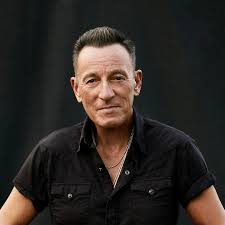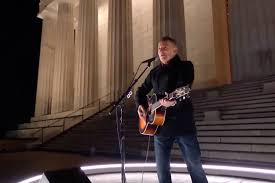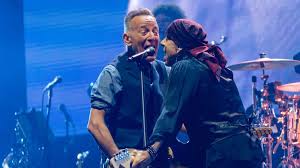[On November 6, Sylvia and I went to see Bruce Springsteen in Toronto. This was a “bucket list” event for me, and the tickets were purchased from funds raised within my broad community to celebrate my retirement from campus ministry and my 70th birthday. This piece is written as a reflection on the meaning of a Springsteen show the night after Donald Trump was elected again to the Presidency, and as a thank you to my beloved community for this generous gift.]
It was the night after.
The fascist won by a landslide.
America had shown its deepest character.
And Bruce Springsteen was in town.
My bucket list.
Really, the only thing on the list.
A Springsteen show,
gifted to me by the generosity of my community.
A retirement gift.
A 70th birthday present.
And the Boss was late.
An hour and a half late.
The crowd wasn’t restless,
just increasingly inebriated.
How would this show unfold?
Bruce was on the losing side of this one.
He knew what a second Trump term would mean.
He knew the depths of fear and anxiety of so many
in his nation.
Would he talk about it at all?
Would he give a nod to the mood of so many
by singing,
Baby, I’ve been low
But never this low
I’ve had my faith shaken
But never hopeless
This is my confession
I need your heart
In this depression
I need your heart
(from “This Depression”)
Nope. No depression on this evening.
Rather, he began as he had begun
throughout this tour,
with a “fighting prayer for his country.”
The “land of the free”
and “home of the brave”
doesn’t seem that free anymore,
nor does it feel like home for so many.
So the Boss echoed that homelessness
by opening the show with “Long Walk Home.”
Things have fallen apart.
Relationships are fractured,
neighbours are strangers,
the Veteran’s Hall is silent and alone,
the diner is shuttered and boarded,
and it is all “gone.”
And, in the face of such homelessness,
 It’s gonna be a long walk home
It’s gonna be a long walk home
Hey pretty darling, don’t wait up for me
Gonna be a long walk home
Hey pretty darling, don’t wait up for me
Gonna be a long walk home
It’s gonna be a long walk home
Springsteen is singing the blues
for his nation, his community, his culture.
But the Boss never leaves us without hope,
never leaves us in the blues,
because there is always gospel,
always good news,
always a place of hope.
Sometimes it is God,
sometimes it is the American dream.
And it isn’t always easy to distinguish between the two.
In what he describes as the best verse
he has ever written, he sang:
My father said “Son, we’re lucky in this town,
It’s a beautiful place to be born.
It just wraps its arms around you,
Nobody crowds you and nobody goes it alone”
“Your flag flyin’ over the courthouse
Means certain things are set in stone.
Who we are, what we’ll do and what we won’t.”
Affirming a vision of life
that holds together individualism
(“nobody crowds you”)
with a strong sense of community
(“nobody goes it alone”),
the Boss reaches for bedrock.
The flag flying over the courthouse
bears witness that
“certain things are set in stone.”
While America might now experience
a time of home-breaking enmity,
there is a certainty in
“who we are, what we’ll do and what we won’t.”
This is a “fighting prayer” for America
precisely because that bedrock seems to be shaken.
You see, if there is one thing
that Springsteen cannot countenance,
it is that the election of Donald Trump
has in fact revealed precisely
“who” America is and
“what” America is prepared to do.
But here’s the problem.
Nothing is “set in stone.”
Seismic shifts happen.
And no system of belief,
no symbolic structure,
no mythology,
is immutable.
Indeed, throughout his career,
Springsteen has been chronicling
the ambiguity of the American dream.
He knows only too well that
dreams can become nightmares.
Remember his piercing question
on his 1980 hit, “The River.”
Is a dream a lie if it don’t come true
Or is it something worse
So what of that dream after
the re-election of Donald Trump?
Is it a lie, or something worse?
Well, dreams were never far away
when Springsteen took the stage on the night after.
 Unsurprisingly, “Land of Hope and Dreams”
Unsurprisingly, “Land of Hope and Dreams”
appeared early in the set.
For this part of the ride of the American experiment,
these words are all the more poignant:
I will provide for you
And I’ll stand by your side
You’ll need a good companion for
This part of the ride
Leave behind your sorrows
Let this day be the last
Tomorrow there’ll be sunshine
And all this darkness past
But is it too soon to sing
of the present darkness passing?
On this train, bound for glory,
can we still sing:
This Train
Dreams will not be thwarted
This Train
Faith will be rewarded
This Train
Hear the steel wheels singin’
This Train
Bells of freedom ringin’
How do we sing this song
when the dreams have been thwarted,
the faith is betrayed,
the steel wheels seem to echo of Auschwitz,
and we are hearing sirens of oppression,
not bells of freedom.
Or is that the way faith always works?
Is that the heart of the songwriter’s prophetic calling?
Against the evidence.
 Maybe “The Promised Land” captures
Maybe “The Promised Land” captures
the spirit of our time better.
We need to head straight into the storm that is ahead,
and let this political twister blow it all down,
including the dreams that cannot be sustained:
Well there’s a dark cloud rising
from the desert floor
I packed my bags
and I’m heading straight into the storm
Gonna be a twister to blow everything down
That ain’t got the faith
to stand its ground
Blow away the dreams that tear you apart
Blow away the dreams that break your heart
Blow away the lies that leave you nothing but lost and brokenhearted
If there is going to be hope,
then it must be tempered by the fire of destruction.
If there are going to be dreams,
they cannot be rooted in lies.
If there is going to be a “promised land”
then it will not be a projection from our present reality,
and it will need a deeper and more profound faith.
If it is all falling apart,
if the wrecking ball of
a Trumpian regime
is going to lay the best of America in ruins,
and …
we know that come tomorrow
none of this will be here
… then you’ve got to
hold tight to your anger
and don’t fall to your fears.
 That was all there to be heard
That was all there to be heard
when the Boss sang “Wrecking Ball.”
When your best hopes and desires
Are scattered to the wind
And hard times come and hard times go and
Hard times come and hard times go …
then what else can you say
to the forces of destruction
except to defiantly sing,
Bring on your wrecking ball
Bring on your wrecking ball
C’mon and take your best shot
Let me see what you got
Bring on your wrecking ball
But might this be just more
American arrogant posturing?
Throughout the concert,
indeed, throughout his career,
Springsteen has ranged from
bravado to quiet humility,
from “The Promised Land” to “Badlands.”
Talk about a dream, try to make it real
You wake up in the night with a fear so real
You spend your life waiting for a moment that just don’t come
Well, don’t waste your time waiting
Poor man wanna be rich, rich man wanna be king
And a king ain’t satisfied ’til he rules everything
Yes, that resonated.
Trump was never a poor man,
just a rich man who wants to be a king.
And he will never be satisfied
until he has absolute power,
until he rules everything.
That’s the way it goes with fascist leaders.
And in the face of that kind of power,
that kind of violence,
doesn’t the dream of America
dissolve into a nightmare of fear?
Sometimes, the waiting has just gone on too long,
sometimes, the dream is so decidedly thwarted,
that you just stop wasting your time with waiting.
But not Bruce Springsteen.
The concert began with a “fighting prayer”
because the Boss refuses to give up.
And so, “Badlands” ends
with this confession of faith:
Well, I believe in the love that you gave me
I believe in the faith that could save me
I believe in the hope and I pray
That someday it may raise me above these
Badlands, you gotta live it every day
Let the broken hearts stand as the price you’ve gotta pay
We’ll keep pushin’ ’til it’s understood
And these badlands start treating us good
Going to a Springsteen concert
is kind of like reading Isaiah.
You can get emotional and spiritual whiplash
as you move from despair to hope,
from doubt to faith,
from death to resurrection.
As soon as the dream seems to be dead,
as soon as you have surrendered yourself
to the dissolution of the promised land
into the badlands,
the artist returns to faith, love and hope,
and insists anew that these badlands themselves
must start treating us good,
must become places of hope.
This sounds like Isaiah’s wilderness
springing forth into new life.
But this is no cheap hope because
“broken hearts are the price you’ve gotta pay.”
 And so, at the end of three hours of high energy rock n’ roll,
And so, at the end of three hours of high energy rock n’ roll,
the Boss returns alone to the stage for the final encore.
Acoustic guitar in hand,
he brings us back, one more time,
to the matter of dreams.
No one, and certainly not Bruce Springsteen,
can live without dreams.
And, in the face of death,
of a friend, of a nation, of a dream,
we simply must have new dreams.
For Bruce, like the Jesus he follows,
death cannot be the end.
So in the face of this culture of death,
and even though Springsteen’s soul
“feels like its been split at the seams,”
he left us with a new promise,
“I’ll see you in my dreams.”
I’ll see you in my dreams
When all our summers have come to an end
I’ll see you in my dreams
We’ll meet and live and laugh again
I’ll see you in my dreams
Yeah, up around the river bend
For death is not the end
And I’ll see you in my dreams
It was a benediction.
A testimony to a life beyond the death
of a friend,
but also, the death of a dream,
the death of a myth,
perhaps even the death of a nation.